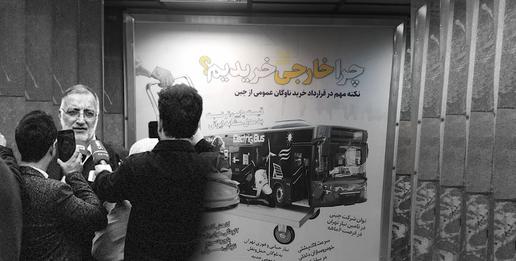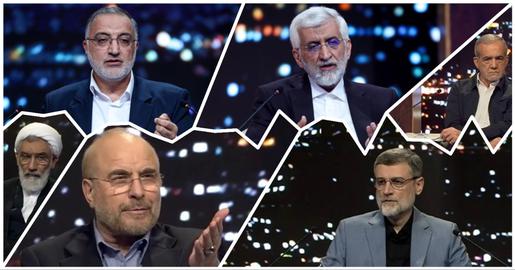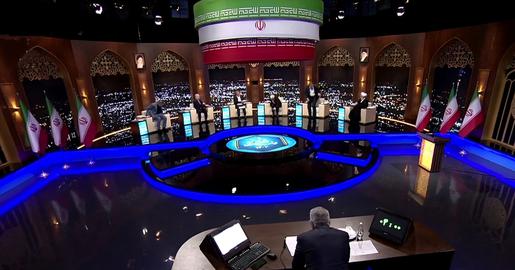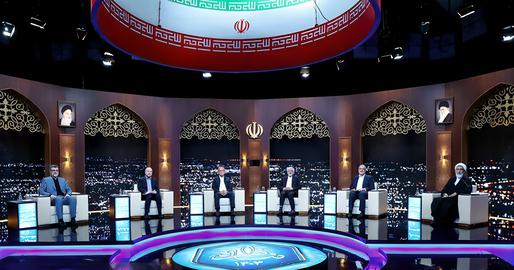“The Americans amuse me," said Iran's Supreme Leader Ayatollah Ali Khamenei, smiling a cynical smile. "While I was in the hospital I was entertained by their false claims that they want to fight ISIS." The Ayatollah's comments were not unexpected, but the timing was unusual. The veteran reporter for Iran's state television seemed to be there just to congratulate the Supreme Leader on a speedy recovery and asked after the general state of his health after prostate surgery. But after a meandering spiel on the kindness of the Iranian people and the people around the world towards himself, the Ayatollah suddenly lashed out against US attempts to forge an international coalition against Islamic State militants in Iraq. As many times in the past, Khamenei even got personal, he condescendingly dismissed State Department spokesperson, Marie Harf, as "that girl," and Under Secretary of State for Political Affairs, Wendy Sherman, as "that woman." In a speech in 1997, Khamenei criticized then Secretary of State Warren Christopher for being too ugly.
Khamenei's comments were made just a few hours after US Secretary of State John Kerry, French leader Francois Hollande and others emerged from talks pledging their support for a unified front against IS militants, Khamenei dismissed the US-led strategy as “absurd” and “futile”. He said that, although some Iranian officials had voiced support for cooperation, he was proud that Iran had refused the offer, knowing full well that US officials were acting in bad faith to serve their own dubious agendas. “There is no higher honor for us,” he said, “that in the collective activities, activities that are wrong and misguided, the US should be disappointed by us and not want to work with us. This is an honor, not a sorrow.” Iran’s leaders had been asked a total of three times to join the US and its allies. Now, to the ayatollah’s satisfaction, Kerry and his team had turned their attention elsewhere.
“America wants to find an excuse to do in Iraq and Syria what it has been doing in Pakistan”, Khamenei said. “Pakistan has an established government and a powerful army, but the US enters Pakistan without permission and bombs wherever it wants”, he said. “They should know,” he warned, “that if they do this, they will again encounter the same problems they have had for a decade in Iraq.”
In recent months, Iran’s hardliner media, including Fars News Agency, affiliated with the Revolutionary Guards, has portrayed the emergence of Islamic State militants as a Western conspiracy aimed at paving the way for a United States military comeback to the region. Khamenei’s comments support this view, the latest in a series of vitriolic attacks on US and Western intentions in the region. Pro-Rouhani media has depicted potential collaboration as a good opportunity for the country to work with its neighbors, and Rouhani himself has said the government would not rule it out.
Denying that the US had played any role in confronting Islamic State extremism, the Supreme Leader said if anyone was responsible for reducing threats in Iraq and Syria, it was the Iraqi army, and they would continue to have the most influence and success in months to come.
There has been widespread speculation about Iran’s military presence in Iraq since the Islamic State rose to prominence earlier this year, seizing Mosul and other key towns. A number of news outlets have published photographs of the head of the Revolutionary Guards’ Qods Force, General Ghasem Soleimani, in Iraq. And Iran is said to have played a key role in arming Kurdish Peshmerga and organizing smaller scale Shia militias to fight against IS forces. The Supreme Leader’s comments suggest that Iranian presence in Iraq is set to continue. He believes Iran —not France, the US or Sunni-dominated countries in the region — will be instrumental in carving out Iraq’s future, not least because, in his view, it has played a key role in the formation of Iraq’s new government and the recent departure of Nuri al-Maliki. He will not tolerate suggestions that a coalition can be effective in a region that Iran has worked so hard to dominate politically, militarily and financially. As Rouhani tries to cast his administration as more open and willing to explore options and solutions, Khamenei has engineered another direct clash with the president, insisting that once again, he will have the final word.

























comments